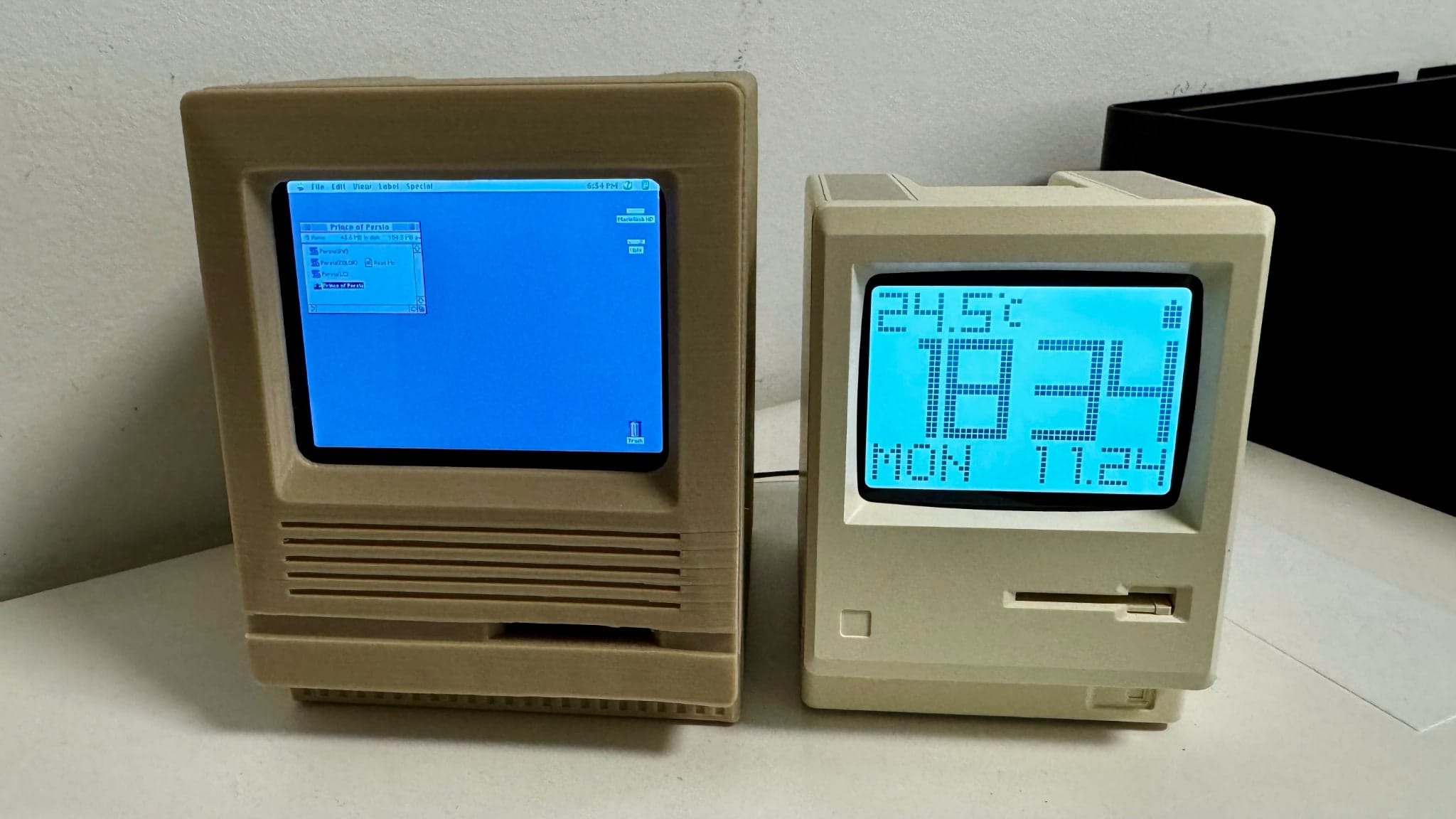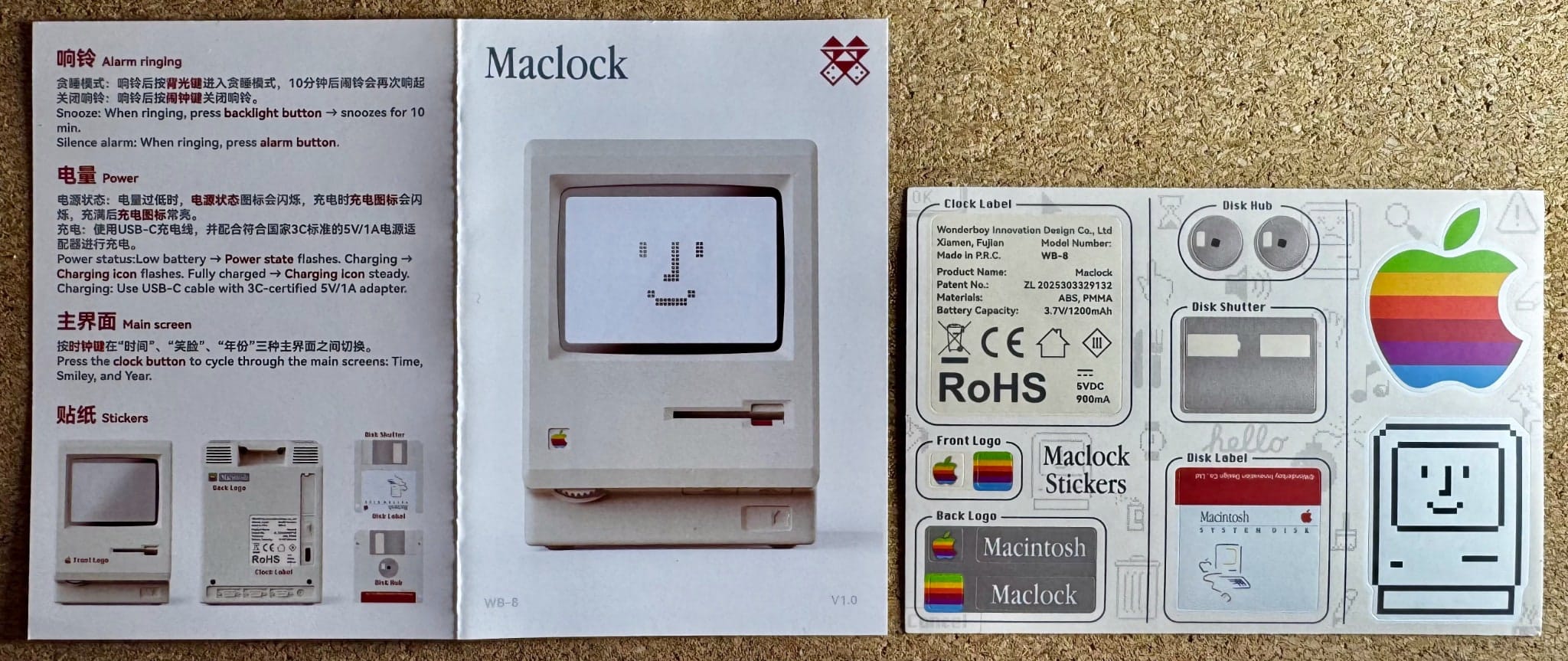If you’re anywhere near the intersection of Apple nostalgia, retro-computing and DIY electronics, This Does Not Compute’s latest video was probably on your radar. If not, the gist is simple: there is an 11 cm tall alarm clock shaped like a Classic Mac, and I grabbed one off AliExpress for roughly EUR 20.1

Even though I paid for it myself, I couldn’t help filing it as a review because, well… It’s just great.
Why I Got It
I enjoy retro-computing but lack the time (and space) to restore vintage hardware, so I usually settle for emulation, and even then I find there is very little I actually want to re-live from those days.
Early Mac OS is the exception–it reminds me that user experience used to be much simpler and intuitive, which is why I still use the Platinum GTK theme and rant about modern UI now and then.
During college I worked daily on Mac IIs, and I was eventually given three broken Mac Classics, from which I scavenged parts to build a working one. That machine is long gone but I loved it and have always wanted to have something like it around, so earlier this year I built a “mini Mac” (a full-sized replica just wouldn’t be a good fit for my cramped office).
It runs After Dark screensavers, Prince of Persia and plenty of old software, while moonlighting as a Tailscale exit node. Still, it lacks audio and the exposed USB ports annoy me, so I’ve been redesigning the case and accessories at a leisurely pace:

I even modelled a matching mouse shell around a two-euro USB rodent, that I am still trying to get right:

The plan was to print both in the perfect vintage-colored PLA (which took me quite a while to track down), but the Maclock is such a good replica that it felt like the ideal shortcut.
The Hardware
It’s noticeably smaller than my printed case:

My guess is that the form factor is heavily inspired by the Pi zero version from 2022, which was of a comparable size, but the Maclock’s level of polish is just amazing.
I haven’t opened mine yet since [the video] goes into more than enough detail into the internals (one PCB stuck to the display, a battery fixed to the bottom, and buttons).
Also, it clearly wasn’t designed to be opened–an initial attempt with plastic wedges showed the plastic will score easily, so I decided to hold back until I get my second unit. But the details are lovely:
- Powering it on requires inserting the tiny plastic floppy disk
- Toggle the clock mode and the classic smiling Mac greets you
- A small acrylic dome gives the LCD a CRT-style curve
- There’s a fake power switch above the USB-C port
- Side grilles run along the base just like the original vents
- The back panel has insets for the logo, keyboard jack and other period details
- Cosmetic screws sit exactly where you expect (in the exact same infuriating locations, even though they don’t actually hold anything in place)
- A brightness knob is just under the screen (which I am planning to repurpose as a volume knob)

Even the sticker sheet feels premium:

The only thing slightly off is the stencilled grille on top, but overall this is a loving recreation. Apple should probably sell it as a licensed product instead of releasing iPhone socks.
The Software
It’s an alarm clock. You can set the time, set an alarm, and it has an invisible snooze button on top that seems to be based on a capacitive touch sensor. It’s fine. That’s most definitely not the point of it for me.
Next Steps
By my measurements the case should fit the original Waveshare 2.8-inch LCD used in the Pi Zero build–the visible diagonal inside the curved lens is roughly 7 cm, and my only concern is that mounting it might be tricky because of an asymmetrical bezel.
But my ideal upgrade would be a high-resolution monochrome backlit panel, which I would love to see as a product. If anyone knows of such a display around 2.5 to 3 inches with 384x512 resolution, please drop me a line, I will write a driver for it.
All the other parts are already in a project box for a couple of years: audio amp, speakers, USB sound card and a Pi Zero 2. I just need a plan to lay them out internally before I crack the shell open and route at least one external USB port.
My plan is to eventually gut one of the units, 3D print an internal frame for the electronics and carefully cut openings for USB-C, audio and maybe a power button (or re-use the existing clock buttons). A Dremel feels risky, so I’ll probably resort to an ultrasonic cutter (which I don’t have) or a heated blade.
But until the second unit and the display arrive, I’m going to be measuring this thing with calipers–there simply isn’t a freely available 3D model at this scale with comparable fidelity. If Wonderboy Innovation Design Co., Ltd. is reading this: you’ve nailed it and made a lot of people very happy–but can we please have the STEP files?
-
I actually ordered two, just in case these get nuked from orbit. Three would have felt excessive, but who knows? ↩︎